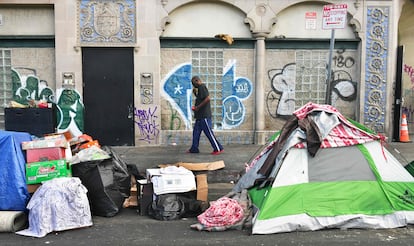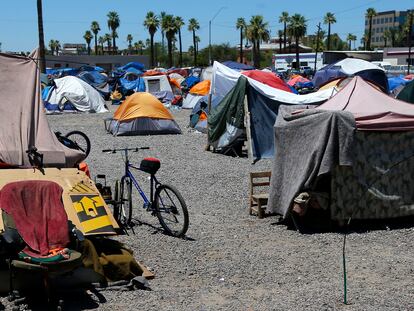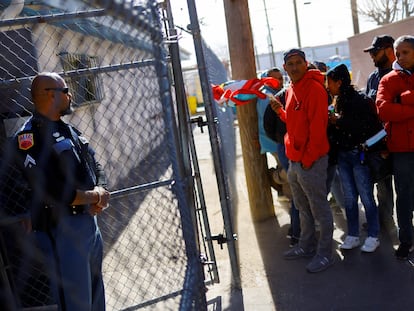Sacramento prosecutor sues California’s capital city over failure to clean up homeless encampments
Sacramento County had nearly 9,300 homeless people in 2022, according to the annual Point in Time count. That was up 67% from 2019. Roughly three-quarters of the county’s homeless population is unsheltered

A Sacramento prosecutor is suing California’s capital city over failure to clean up homeless encampments. Sacramento District Attorney Thien Ho says his office asked the city to enforce laws around sidewalk obstruction and to create additional professionally operated camping sites.
He announced the suit Tuesday during a news conference in Sacramento. Ho said the city is seeing a “collapse into chaos” and an “erosion of every day life.”
Sacramento County had nearly 9,300 homeless people in 2022, based on data from the annual Point in Time count. That was up 67% from 2019. Roughly three-quarters of the county’s homeless population is unsheltered.
Homeless tent encampments have grown visibly in cities across the U.S. but especially in California, which is home to nearly one-third of unhoused people in the country.
The prosecutor had threatened in August to file charges against city officials if they didn’t implement changes within 30 days.
At the time, Sacramento Mayor Darrell Steinberg said Ho was politicizing the issue instead of being a partner with the city.
The city has added 1,200 emergency shelter beds, passed ordinances to protect sidewalks and schools and has created more affordable housing, Steinberg said in a statement. He further added the city is trying to avoid “the futile trap of just moving people endlessly from one block to the next.”
He said people’s frustrations are “absolutely justified” but called Ho’s actions a “performative distraction.”
“The city needs real partnership from the region’s leaders, not politics and lawsuits,” he said.
Ho, elected in 2022 after vowing on the campaign trail to address the city’s homelessness crisis, said he’s asked the city to share real-time data about available shelter beds with law enforcement.
“This is a rare opportunity — a rare opportunity — for us to effectuate meaningful, efficient means of getting the critically, chronically unhoused off the streets,” Ho said.
Ho said he supports a variety of solutions, including enforcement of existing laws and establishing new programs to provide services to people facing addiction or mental health issues. He said he supports a statewide bond measure that would go toward building more treatment facilities. Voters will weigh in on that measure next year.
The dispute between the district attorney and the city was further complicated by a lawsuit filed by a homeless advocacy group that resulted in an order from a federal judge temporarily banning the city from clearing homeless encampments during extreme heat. That order is now lifted, but the group wants to see it extended.
The attorney of the homeless coalition also filed a complaint with the state bar this month, saying Ho abused his power by pushing the city to clear encampments when the order was in place.
Ho’s news conference included testimony from residents who say the city is not providing resources to deal with homelessness.
Critics have said encampments are unsanitary and lawless, and block children, older residents and disabled people from using public space such as sidewalks. They say allowing people to deteriorate outdoors is neither humane nor compassionate.
But advocates for homeless people say they can’t alleviate the crisis without more investment in affordable housing and services, and that camping bans and encampment sweeps unnecessarily traumatize homeless people.
Sign up for our weekly newsletter to get more English-language news coverage from EL PAÍS USA Edition
Tu suscripción se está usando en otro dispositivo
¿Quieres añadir otro usuario a tu suscripción?
Si continúas leyendo en este dispositivo, no se podrá leer en el otro.
FlechaTu suscripción se está usando en otro dispositivo y solo puedes acceder a EL PAÍS desde un dispositivo a la vez.
Si quieres compartir tu cuenta, cambia tu suscripción a la modalidad Premium, así podrás añadir otro usuario. Cada uno accederá con su propia cuenta de email, lo que os permitirá personalizar vuestra experiencia en EL PAÍS.
En el caso de no saber quién está usando tu cuenta, te recomendamos cambiar tu contraseña aquí.
Si decides continuar compartiendo tu cuenta, este mensaje se mostrará en tu dispositivo y en el de la otra persona que está usando tu cuenta de forma indefinida, afectando a tu experiencia de lectura. Puedes consultar aquí los términos y condiciones de la suscripción digital.










































